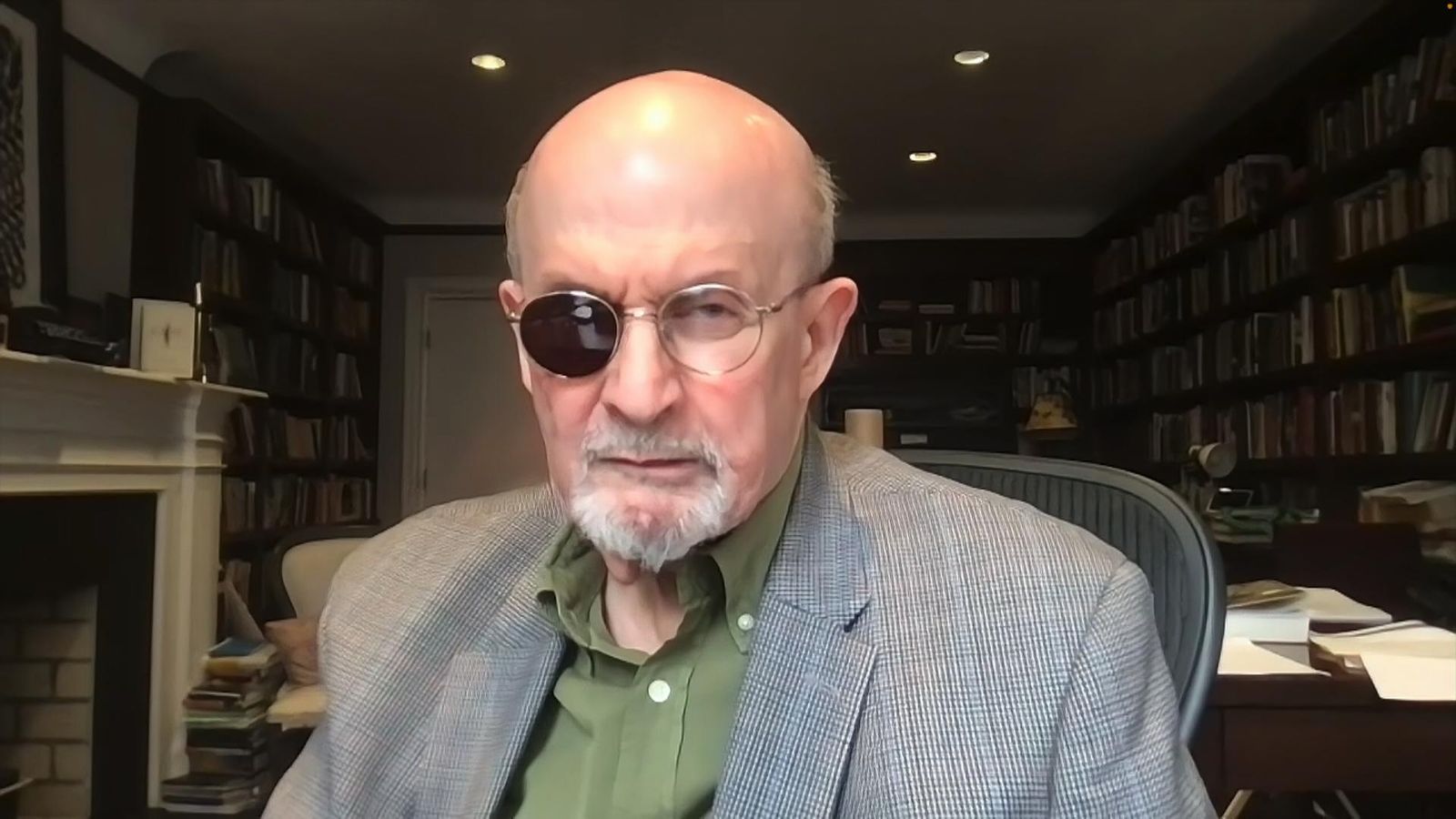Sir Salman Rushdie has told Sky News he thought it would be “the end” for him after he was repeatedly stabbed at a public lecture in 2022.
The Indian-born British author suffered life-changing injuries including the loss of his right eye following the attack at the Chautauqua Institution in New York state.
Speaking to The World with Yalda Hakim, the author described the “unpleasant experience” where he recalled the attacker having a “clear run” at him and within 30 seconds Sir Salman had sustained more than a dozen different injuries.
“Half a minute with a knife… You can do a lot,” he said, adding that the knifeman was only restrained after the surprise attack.
The distinguished novelist said he was lucky to emerge from the incident alive.
The 76-year-old said: “Fortunately he missed a lot of places that would have been immediately fatal. Although there was a big cut across my neck, he didn’t get the artery.
“Although there were three injuries to my torso, he didn’t reach the heart – in that sense, it was a piece of good fortune in the middle of an unpleasant experience.”
After the attack, Sir Salman said he recalled “lying on the floor in a substantial lake of blood, and I clearly remember thinking this was about to be the end,” adding: “Fortunately, I was wrong.”
Please use Chrome browser for a more accessible video player

1:04
Witnesses rush to help author after attack
In 1989, Iran’s then leader Ayatollah Ruhollah Khomeini issued a fatwa calling for the author’s death after the publication of his book, The Satanic Verses, which many Muslims consider blasphemous.
Sir Salman had done hundreds of public events before Chautauqua where he was due to speak about free speech and said there had “never been a hint of trouble before” and this attack had “come out of the blue”.
His alleged attacker – Hadi Matar, a 24-year-old man from New Jersey, has pleaded not guilty and is awaiting trial.
‘Contending’ with fanaticism
The author who has lived in the US for 20 years has rarely buckled in the face of extremism and staunchly stands by the tenet of freedom of expression.
In his new book, Knife: Meditations After An Attempted Murder, Sir Salman talks about the attack.
He said: “If something as significant as this happens in a writer’s life, it’s not unusual for me to tackle it. I felt like regaining control of the narrative. The book is my way of doing that.”
When asked about the Batley Grammar School incident, where a teacher who showed a caricature of the Prophet Muhammad was forced into hiding, Sir Salman said the situation was “terrible”.
“It’s disgraceful that that is allowed to happen… Hopefully, the government will take action to stop this kind of fanaticism from spreading.”
Read more: Why is Salman Rushdie so controversial?
Some scenes from the Satanic Verses depict a character modelled on the Prophet Muhammad and the book was burned around the world and translators of the work were attacked – Hitoshi Igarashi, who translated it into Japanese, was murdered in 1991.
Regarding the recent ruling where a Muslim student lost a legal challenge against a school’s “prayer ban”, Sir Salman said: “School is a place where you get educated and mosques are places where you go to pray and you can’t turn one into the other.”
In a message intended for young people, Sir Salman said: “Islam historically has not been like this. The Indian Islam I grew up in was Sufi, mystical and entirely peaceful.
“I recommend people study a bit more widely the more traditional forms of Islam which don’t have these interests of violence.”
On 21 April, Sir Salman will discuss his latest book and the attack as part of a series of events for the Southbank Centre’s Spring Literature and Spoken Word Season.
Sir Salman began his writing career in the early 1970s and won the Booker Prize in 1981 for his novel Midnight’s Children, about the birth of modern India.












Post comments (0)